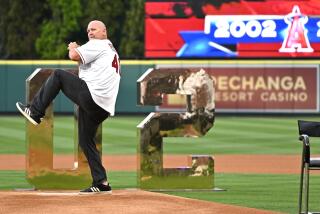Percival agrees to terms on deal with Cardinals
- Share via
Troy Percival’s comeback after two years away from the game is nearly complete. The former Angels closer has agreed to terms on a minor league contract with St. Louis and is expected to join former Angels teammates Jim Edmonds, David Eckstein, Adam Kennedy, Scott Spiezio and Russ Springer on the Cardinals in about two weeks.
Percival, the 37-year-old right-hander who had 324 saves, all but eight of them with the Angels, has not pitched since July 2005 because of a forearm injury suffered in the first year of a two-year, $12-million deal with Detroit. He retired in April after signing a ceremonial minor league deal with the Angels.
But Percival started throwing again later in April, and when his velocity began to return -- without the pain -- he began considering a comeback. After a number of workouts at UC Riverside, he received offers from about 10 teams before settling on St. Louis, where he will probably serve as a set-up man for closer Jason Isringhausen.
“I know what a competitor he is, and I know he’s wise enough to say if he’s got something or he doesn’t,” Spiezio said. “He’s got a chance to help us.”
Paul Cohen, Percival’s agent, said Percival’s deal has a low base salary, believed to be in the $500,000 range, and is based almost entirely on appearances. If he pitches for the rest of the season, he could make between $1.5 million and $2 million.
The deal also includes an opt-out clause that allows him to become a free agent if he is not added to the big league roster in two weeks. Percival is expected to report to triple-A Memphis on Monday.
Detroit, San Francisco, Philadelphia, Oakland, Tampa Bay and Cleveland also expressed interest in Percival, whose fastball hit 90 mph during recent workouts. Percival, who saved three games in the 2002 World Series for the Angels, also throws a curve, changeup and has added a sidearm pitch.
“In light of the fact he hasn’t pitched in two years, Troy gave me two parameters to work with,” Cohen said. “One, he didn’t need to close. Two, he’s made plenty of money, so the deal can be a shared risk. If he’s healthy and pitches, he gets paid. If he gets injured, it won’t hurt the team.”
--
More to Read
Go beyond the scoreboard
Get the latest on L.A.'s teams in the daily Sports Report newsletter.
You may occasionally receive promotional content from the Los Angeles Times.








